Biology
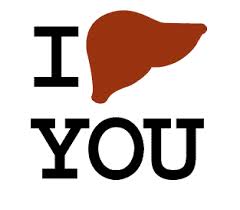
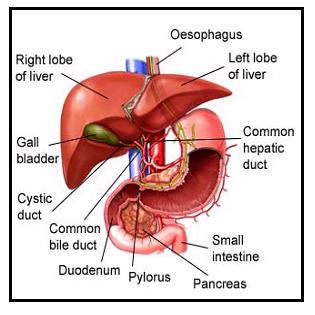
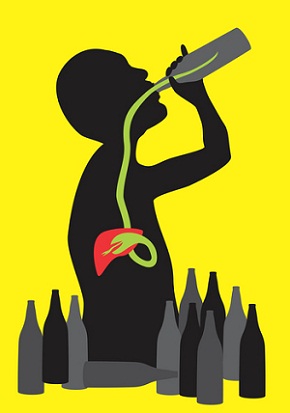
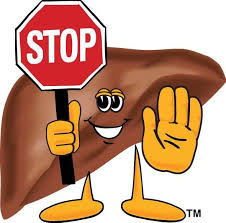
- Glycogenolysis
Term: glycogenolysisLiterally meaning: ? dissolution og glycogen?Origin: Greek?????????/glycag?no(=glycogen) >??????/glycos(=sweet) as glycose, an older term for glucose +?????/lysis(=dissolution, degradation > verb ???/leo =break up, solve, loose,...
- Hepatomegaly
Term: hepatomegaly Literally meaning: ?large liver?Origin: Anc Greek????/hepar(=liver) >(genitive case) ??????/hepatos >????>?????????/eperomai(=expand) probably because liver has the capacity to regenerate after injury and to adjust its...
- Hepatitis
Term: hepatitisOrigin Anc Greek????/hepar(=liver) >genitive ??????/hepatos >????>?????????/eperomai(=expand) probably because liver has the capacity to regenerate after injury and to adjust its size to match its host. In Greek mythology,...
- Cirrhosis
Term: cirrhosis Origin: Anc Greek ??????/kirros(= yellowish) + ????/-osis(= suffic meaning a state of disease) because of tawny color of diseased liver. Coined : in 1819 by French physician René Laennec (1781 ?1826) Definition:Cirrhosis is a...
- 1/28/14
Today Mrs.Tyrell got some cow liver and did many things with it. First she added water which did nothing to the liver, but then she add hydrogen peroxide which made it bubble and fizz. I honestly thought the cow liver looked nasty. ...
Biology
Liver is my Lover
1. The liver is the largest internal and most metabolically complex organ in humans.
2. Liver is also the largest gland in our body.
3. The weight of human liver is about 1.5 kg.
4. The study of liver is known as Hepatology. (The Greek word for liver is hepar).
5. The liver performs over 500 different functions. Some of them are
a. Fight off infection
b. Neutralize toxins and harmful chemicals such as liquor, beer, wine and drugs.
c. Detoxify food impurities
d. inspects nutrients before allowing them into the bloodstream.
e. Manufacture proteins and hormones.
f. Control blood sugar level.
g. Help to clot the blood.
h. Store iron and other important vitamins and minerals.
i. Enable to digest the fat in your food by releasing bile juice.
j. Store glucose in the form of glycogen.
k. Synthesize cholesterol.

6. The liver is the only organ that can regenerate itself!! So one can donate a part of his liver to another person. When a portion of the liver is transplanted, the donor's liver will regenerate back to its original size while the transplanted portion will grow to the appropriate size for the recipient.
7. About 1.4 litre of bile juice is produced daily.
8. Gall bladder stores bile from the liver. It is used to break down dietary fat into tiny droplets. It facilitates the fat digestion.
9. The liver always contains about 10% of the blood in your body and it pumps about 1.4 litres through per minute.
10. The first human liver transplantation was performed by Dr. Thomas E. Starzl (1963). But it was not 100% successful due to lack of immunosuppressive drugs. Four years later, he performed first successful liver transplantation.
11. Hepatitis B (a viral disease) is one of the most serious forms of hepatitis. The National Liver Foundation reports Hepatitis B is more common and much more infectious than AIDS.
12. Chronic Hepatitis B leads to liver cirrhosis (damaging of the liver cells).

13. One glass of wine, a can of beer or a shot of whiskey can be equally damaging to the liver.
14. Alcoholism mostly attacks the liver. It leads to the damage of liver tissues called liver cirrhosis.
15. If you avoid alcohol during the week and, then, binge drink on the weekends, this is also bad and may cause even greater damage.
16. Anyone who drinks more than five drinks per day is at serious risk of developing alcoholic liver disease.
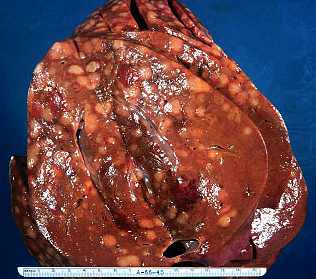 |
| Liver cancer |
How to take care of your liver?
- Avoid alcohol completely.
- Avoid excessive use of drugs you take. Do not use any drugs without the advice of doctors.
- Take care about the aerosol sprays you breathe. Your liver detoxifies what you breathe in. When you?re around aerosol cleaners, mildew sprays and paint sprays, for example, make sure the room is well ventilated or wear a mask.
- Every time you are around insecticides, cover your skin with gloves, long sleeves, a hat and mask. These harmful chemicals can enter your body through your skin and destroy cells in the liver.
- Don?t expose yourself to hepatitis viruses. They live in bodily fluids, blood, saliva and seminal fluid.
- Eat a well balanced, healthy diet without too much fat.
- Glycogenolysis
Term: glycogenolysisLiterally meaning: ? dissolution og glycogen?Origin: Greek?????????/glycag?no(=glycogen) >??????/glycos(=sweet) as glycose, an older term for glucose +?????/lysis(=dissolution, degradation > verb ???/leo =break up, solve, loose,...
- Hepatomegaly
Term: hepatomegaly Literally meaning: ?large liver?Origin: Anc Greek????/hepar(=liver) >(genitive case) ??????/hepatos >????>?????????/eperomai(=expand) probably because liver has the capacity to regenerate after injury and to adjust its...
- Hepatitis
Term: hepatitisOrigin Anc Greek????/hepar(=liver) >genitive ??????/hepatos >????>?????????/eperomai(=expand) probably because liver has the capacity to regenerate after injury and to adjust its size to match its host. In Greek mythology,...
- Cirrhosis
Term: cirrhosis Origin: Anc Greek ??????/kirros(= yellowish) + ????/-osis(= suffic meaning a state of disease) because of tawny color of diseased liver. Coined : in 1819 by French physician René Laennec (1781 ?1826) Definition:Cirrhosis is a...
- 1/28/14
Today Mrs.Tyrell got some cow liver and did many things with it. First she added water which did nothing to the liver, but then she add hydrogen peroxide which made it bubble and fizz. I honestly thought the cow liver looked nasty. ...
